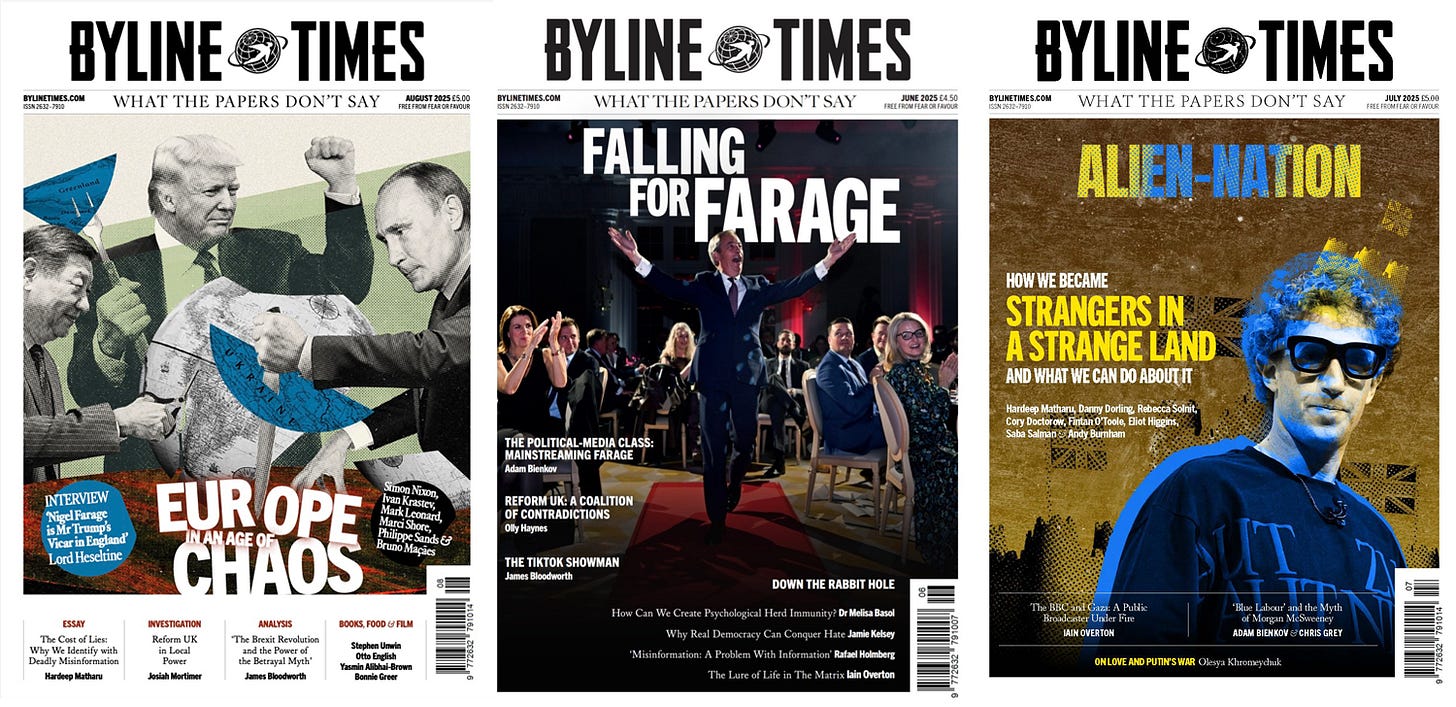Nigel Farage’s Reform UK are now a significantly bigger far-right threat to the UK than previous generations of explicitly racist parties like the British National Party, the leader of Britain’s foremost anti-racism campaign group Hope not Hate, has told Byline Times.
Nick Lowles, whose new book How to Defeat the Far Right is published on Thursday, told a live Byline Supplement event that Reform was helping to mainstream political ideas that were previously deemed unacceptable, even on parts of the far right.
“Back in 1999 the British National Party, led by a man who was a Holocaust denier, thought that Britain shouldn’t have gone to war with Germany and believed that black people were genetically inferior to whites… dropped their repatriation policy because they felt they couldn’t even sell it to their own supporters anymore,” Lowles points out.
“And now we’re facing a situation where a party that is leading in the polls can literally in the space of two weeks, have two policies that could be deporting a million people from this country, and there’s very little pushback in the media or in political circles”.
Lowles said that in some respects Farage’s party were even more extreme than what had come before them.
“The policies that they put out in the last few weeks on immigration, would be the most extreme policies that we’ve had from any political party, and I would say, was probably more extreme than the public positions of the BNP in its heyday” he said.
“The demonisation of minorities, the use of conspiracy theories, the support for autocratic regimes around the world.
“And while they’re not anti-democratic in the sense of a group that wants to overthrow the system, they are certainly wanting to subvert the system and dismantle some of the pillars of what we would see as liberal democracy.”
Reform’s acceptance by the political mainstream is also making their ideas much harder to combat for anti-racism groups than previous far-right movements, Lowles said.
“Even though the BNP were winning support in certain working class communities and sometimes winning 30-40% of the vote [in those areas], they were still quite a marginal force, and they were outside of the political mainstream,” he told Byline Times.
“But what we’re facing now are far right and radical right ideas, which are firmly in the political mainstream, which it makes it makes it much harder to to take on.”
Whereas in the past there was a “social cost” to supporting groups like the BNP and their calls for ideas like mass deportations, Reform could now push a similar agenda with ease across both new and more traditional media platforms, Lowles said.
“There was a social cost of being involved with the BNP… and they were shunned by the media… Whereas we’re in a situation now where this kind of right wing discourse dominates social media and there’s a ecosystem whether it’s from magazines, newspapers, Substacks, YouTubes, podcasts, X, there’s a plethora of platforms that are just pushing out this sort of content.”
Labour’s Reform Strategy Is ‘Politically and Morally Wrong’
Lowles also condemned the Government’s recent strategy of seeking to compete with Reform’s anti-migration politics.
“I think their strategy is both politically and morally wrong,” Lowles told Byline Times.
“This idea of trying to out-tough Reform is just… not going to work. And actually you get to the point of [Starmer’s] ‘Island of Strangers’ speech where it becomes downright offensive.
Lowles said that the Prime Minister’s “inability to have a clear opposition to Reform” had “emboldened” the far-right.
“I think the combination of this kind of ‘Blue Labour’ attitude that we’ve got to somehow appeal or accept some of the kind of Reform rhetoric, because that’s what voters want, coupled with just an inability to have a clear opposition to Reform led to what happened in the summer, where we had the Labour government virtually silent in terms of the hotel protests, the flag protests and the rise of racism that we’re seeing.
“I wrote to the Prime Minister myself… articulating my frustration with that strategy, because at the time when people needed leadership there was silence.
“And the trouble is for the far right, that silence just emboldened them further.”
Lowles said there was some signs that pressure from groups like Hope not Hate, and many Labour MPs was leading to a shift in strategy from the Government.
“The pushback, I think, from a lot of Labour MPs about [Downing Street’] silence, coupled with the big Tommy Robinson demo, has finally forced them to take some action. But what I’d say is it’s got to be genuine. It can’t be just a speech. It can’t be a photo opportunity.”
You can watch the full recording of our interview with Nick Lowles at the top of this post.
Nick’s book ‘How to Defeat the Far Right: Lessons from Hope not Hate’ is now available to buy from bookshops.








